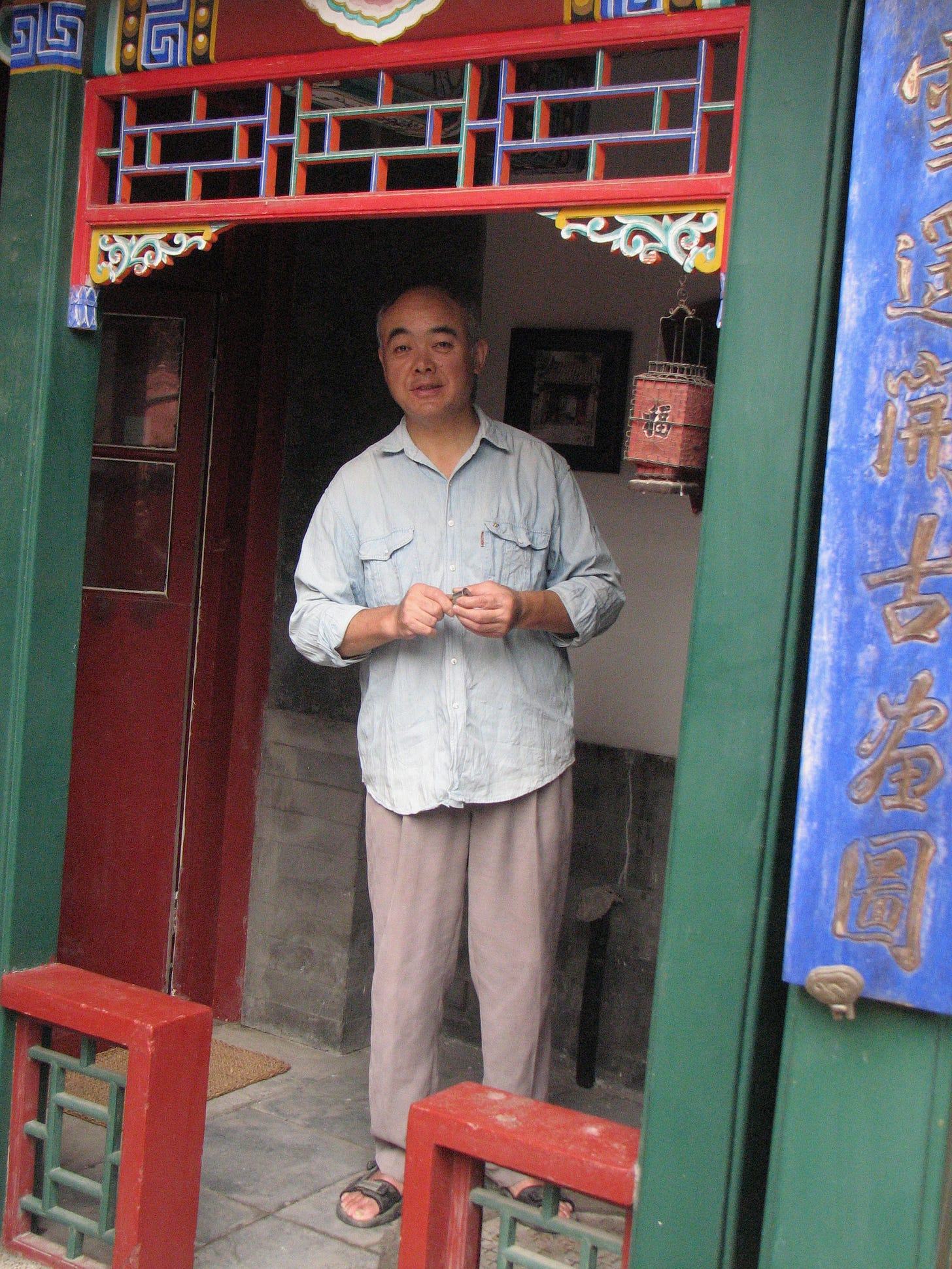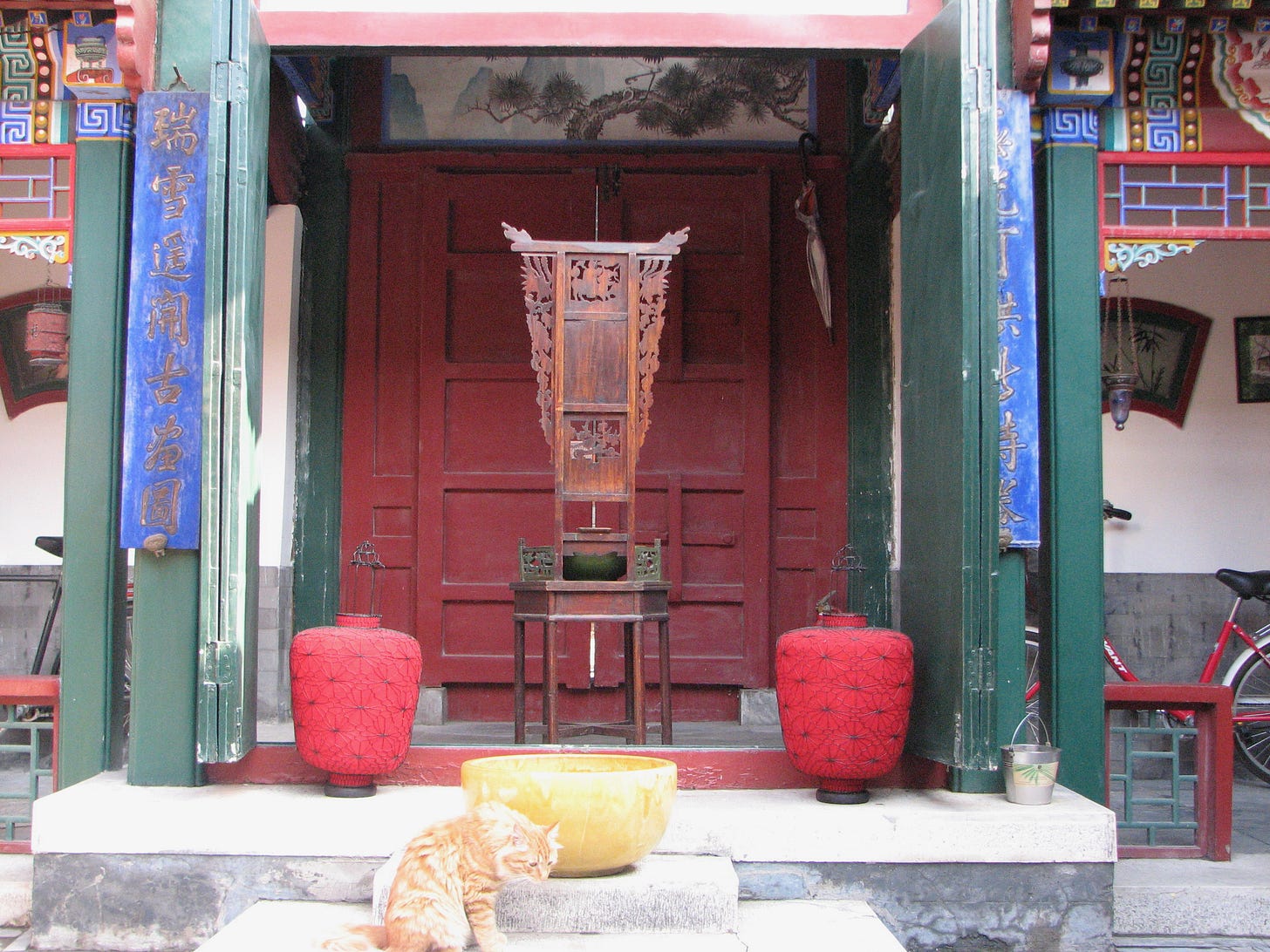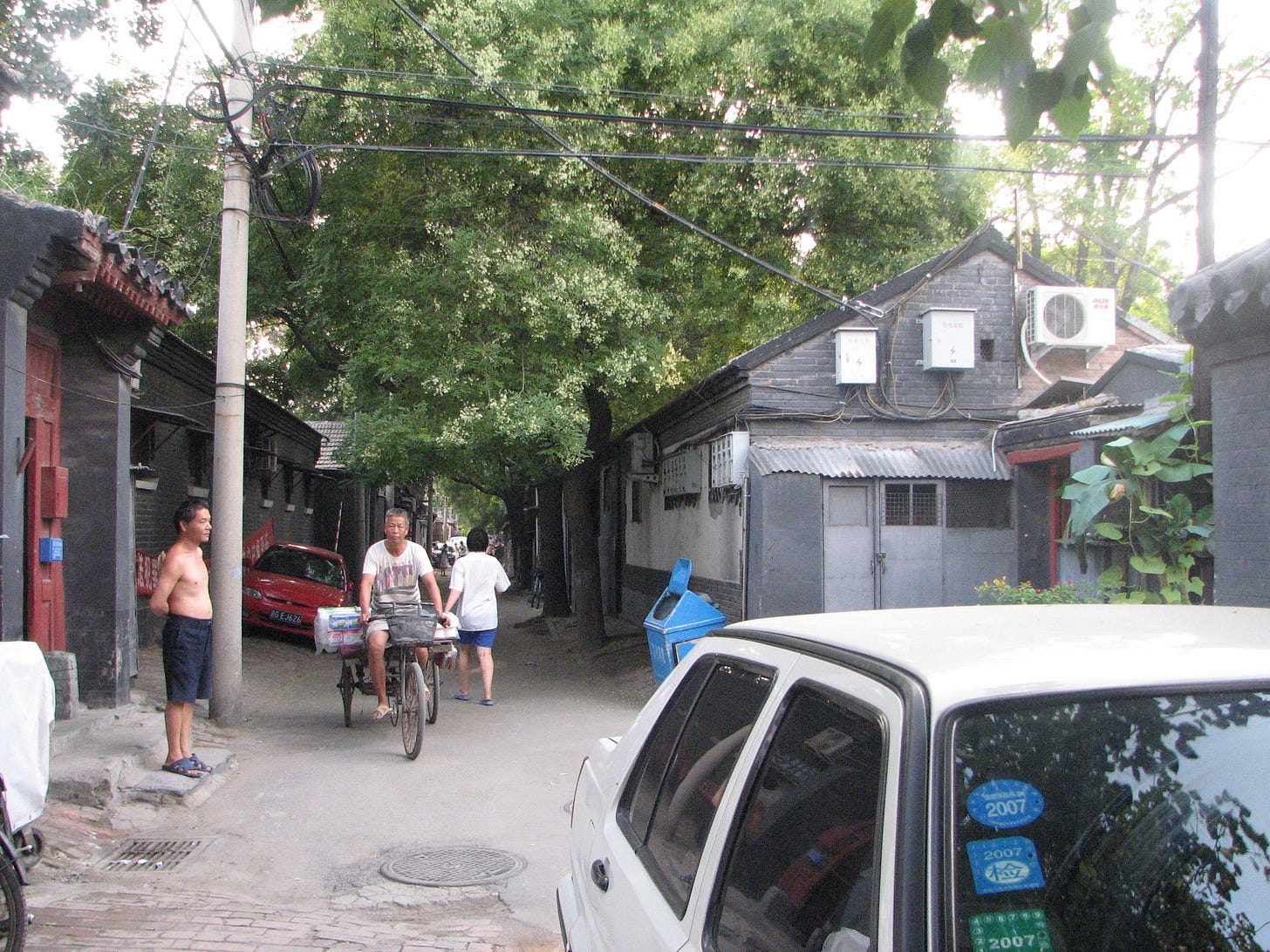I am often asked which amongst the countries I’ve called home is my favourite. It’s a terrible question: like being asked to choose your favourite child, or book. The honest answer is that every place is wonderful if appreciated for what it is, rather than what it isn’t.
That said, the 7 years I lived in Beijing were very special. I didn’t have kids to keep me up at night, or expectorate all over me, which meant I could range freely. China belied every preconception I had of it. I found the people salty, but up for a good laugh. Far from rigid or robotic, I was amazed at the ability of the average Zhou to spot the loophole and take every advantage of it.
The country was experiencing vertiginous change and I knew I had serendipitously found myself at an epochal fulcrum. That one day I would tell my grandchildren: “I was there, when it all happened.”
Unlike western foreign correspondents who saw their primary role as holding China’s authorities to account, I saw my work in China as a way of holding a mirror up to the Indian government; as a provocation to thought and action about our own tussles with modernity and globalization.
The primary divergences in my views and that of many Western reporters was their automatic ascription of all China’s ills to the authoritarian nature of its political system. But I came from a democracy and was uncomfortably aware of how little this achievement had translated into better governance or less corruption. From the impunity of the powerful and the patchy application of the rule of law, to environmental destruction and yawning income inequalities, India’s challenges either matched, or were worse, than China’s.
For me, one of the most critical parts of the job was to humanize China. The country then, and even more so now, tends to be reduced to an abstract shorthand for everything from “human rights violations” to “environmental destruction.”
I wanted to add specificity and life to my China stories.
In this week’s Global Jigsaw post, the first of a series of vignettes of what it was like for a foreigner to live in Beijing’s hutongs in the early part of this millennium in the hutongs of Beijing. I hope you enjoy it. If you do, please share this piece.
And do consider subscribing so I can keep this newsletter going.
**********
The persistent knocking pierced through the pillow I had buried my head in, mistakenly hopeful that if I managed to drown out the noise for a few seconds it would go away. Unwashed and unkempt I emerged from my bedroom and groggily crossed the courtyard until I reached the red lacquered main doors, which I threw open to reveal my newly acquired landlord, Mr. Xu.
We stared at each other for a few seconds in mutual, horrified disbelief. Mr. Xu, a retired railway ministry official, was patently flabbergasted at finding his tenant still half-asleep at as late an hour as half past seven in the morning. Like most Chinese, Mr. Xu must have at this point been awake for several hours, eaten a hearty breakfast, performed his routine morning calisthenics, and had a leisurely read of the newspapers.
Our landlord in Beijing, Mr Xu, during one of his numerous unsolicited visits to our courtyard house. Pic: Pallavi Aiyar
As for me, the unannounced and unsolicited visit by a landlord at the crack of dawn was an ambush.
Once recovered from his initial shock, Mr. Xu bustled past my malodorous self and made his way into the kitchen. I followed and began to ask what it was that he wanted. But he preempted any speech on my part with a raised hand. “Don’t worry about me,” he said brightly. “You must be very busy. Go away and do your work and just ignore me. Ha! Ha!” His chortle was quite obviously feigned.
I spent the next hour cowering in my study trying to do as instructed and to ignore the fact that my landlord was for some mystifying reason manically sweeping my courtyard. When I could no longer take it, I approached Mr. Xu and pleaded with him to desist from sweeping.
I’ll do it myself, I told him, or the maid would when she got in a few hours later. But my pleas fell on deaf ears. “A courtyard must be swept clean every morning” opined Mr. Xu sanctimoniously.
At sixty he moved around with surprising sprightliness, teasing out fallen leaves from troublesome corners. I tugged at the broom gently in a bid to disarm him. But Mr. Xu clung to it tenaciously with an iron grip that once again belied his advanced years. I tugged harder, Mr Xu hung on. Finally using every ounce of strength that I could summon, I wrenched the broom away, falling backwards flat on my bum in the process.
“Please, Mr. Xu. Let me do the sweeping,” I begged, sprawled out on the floor in most undignified repose. Slowly he nodded in defeat. “If there’s nothing else that I can do for you,” he said courteously, “I’ll take my leave.”
My husband, Julio, with our cat, Tofu, in the courtyard of our siheyuan. Credit: Pallavi Aiyar
The elemental drama of life in Beijing’s hutongs, once again revealed itself, if a little early in the morning for my taste.
****
My husband and I had moved into a traditional Chinese-style courtyard home called a siheyuan or four-sided garden a few months ago. Siheyuan are to be found in the Chinese capital’s narrow alleyways or hutongs clustered all around the Forbidden City, many dating as far back as the Mongolian Yuan dynasty.
China’s mad rush to modernity and skyscrapers has sounded the death knell for the majority of these traditional hutong neighbourhoods, but a few have escaped the predatory cranes and bulldozers that invade most parts of Beijing.
Lined by willows and poplars, hutong neighbourhoods are essentially villages hidden away from the surrounding urban sprawl. Too narrow for supermarkets, street vendors and corner shops called xiao mai bu provide residents with their daily needs: candied crab apples, knife-sharpening services, coal for the freezing winters.
In a hutong, life is communal. Following the communist accession in 1949 most of the siheyuan that belonged to imperial grandees and rich merchants were expropriated and handed over to work units which then allocated accommodation to workers. Homes that had for centuries housed the extended families of the city’s elite were transformed into dilapidated shacks that often squeezed in a dozen families, five or more to a room.
Neighbours Credit: Pallavi Aiyar
Hutong homes thus tend to be infused with a certain collective spirit, but communality does not stop at the doors and extends out to the alleyways themselves. Through the changing seasons residents bundle together on the street, chattering excitedly, playing mahjong, or just watching the world go by.
But nothing quite provides the cohesive glue of community life like the hutong’s many public toilets. Few hutong homes have private loos, so public facilities which make an appearance every hundred metres or so play a central role in local life. Here residents gather to exchange news and discuss politics all over a smoke and a dump.
Our new courtyard home as luck turned out, was located directly opposite the neighbourhood convenience putting us right at the center of things. Consequently, while we ourselves had the use of a private washroom within the grey brick interiors of our high walls, almost every time we returned home or left for the day, we were greeted by a pajama-clad denizen, plastic pail in hand, waving to us cheerily, inquiring if we “have eaten,” (chi fan le ma?) - the standard mode of hutong-address.
Neighbours playing checkers at the local xiao mai bu (corner store) bang opposite our home. Pic credit: Pallavi Aiyar
*****
The phenomenon of trendily renovated siheyuan, rented out to foreigners at steep prices was a relatively recent one. So, unlike their snootily cosmopolitan compatriots in the central business district, most hutong dwellers had limited interaction with foreigners.
The arrival of my Spanish husband and Indian self to live in Beixin Qiao Toutiao hutong thus caused understandable consternation. Seeing the crowds that gathered on the day we moved in, one might have been forgiven for thinking the circus had come to town and indeed many of our neighbours seemed to view us as an amusing and exotic species of animal.
Little Wang, from next door stroked my husband Julio’s arm lovingly the first time they met. He fingered the cloth of Julio’s shirt in wonder. “Foreigners!” he’d exclaimed repeatedly in a tizzy of delight.
Our cat, Caramel at the entrance to the house. Credit: Pallavi Aiyar
****
The much-treasured toilet inside our home had a window high up that opened out onto the street just across which was situated the local xiao mai bu, where jolly mahjong and checkers gatherings stretched late into the night.
On my first morning using the facilities, I’d picked up the word “Indian” or “Yindu” drifting in through the window and begun to pay more attention to the animated conversation emanating from outside the xiao mai bu. “Oh! So, she’s Indian?” queried a baritone? “Must be, I think,” replied an alto. “But the husband? He’s not dark enough?” came back baritone. “Yes, she’s black but he’s white. Must be from different countries,” concluded alto.
It felt good to know we provided such fuel for conversation. “Always happy to be of service to our neighbours,” I’d thought.
****
Most days, I sat writing in my study, looking out every once in a while, onto the elegant grey tiled roofs with their upturned eaves. A willow wept into the courtyard and the pomegranate tree was heavy with fruit. The hoarse cries of a street vendor cycling by wafted in. “Ventilator cleeeaner,” he shrieked, every other word elongated in emphasis. “I can clean your dirty ventilatooors.”
“I am the luckiest girl in the world,” I thought to myself.
Itinerant vendor outside our home. Credit: Pallavi Aiyar
****
That’s it for this week.
Hope you all have a lovely Easter week. Hasta la proxima semana! I leave you with a final picture of me with my mother in our Beijing home
Besos,
Pallavi











Hello. Lovely article Pallavi. What you say about your perspective as against that of other foreign journalists is very profound. Hope you are well.
Love this